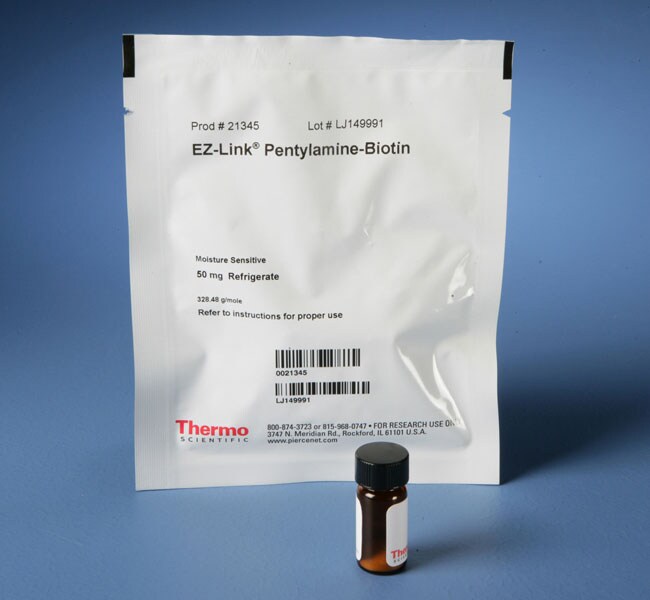
Thermo Scientific EZ-Link Pentylamine-Biotin is biotin that has been conjugated to pentylenediamine to add a short, amine-terminated spacer to its valeric acid group, providing a simple amine-modified compound for different applications.
Features of EZ-Link Pentylamine-Biotin:
• Biotinylation—label molecules and surfaces for assay or affinity purification methods involving avidin or streptavidin probes and resins
• Amine-activated—primary amine can be crosslinked to proteins and material surfaces using EDC and other crosslinkers
• Medium length—spacer arm (total length added to target) is 18.9 angstroms, representing a 6-atom extension of the native biotin valeric acid (and its conversion to a primary amine)
Pentylamine Biotin is a compound formed by modification of the valeric acid side chain of biotin with pentane-1,5-diamine. The compound contains terminal primary amine (-NH2), which provides a functional handle for derivatization or conjugation to proteins, surfaces and other molecules. Carbodiimide (EDC) and NHS-ester crosslinker chemistries are most often utilized for covalent modifications involving amino-biotin molecules. The compound is also useful as an amine-alternative to native (carboxylate) biotin for assays and methods that require a biotin standard or blocking step.
We manufacture biotin reagents to ensure the highest possible overall product integrity, consistency and performance for the intended research applications.
Amino-biotin compounds can be conjugated to functional groups of proteins and other molecules in a variety of ways. The most common method is to crosslink the terminal primary amine to carboxyl groups using . Carboxyl groups (-COOH) occur in aspartate or glutamate residues and the carboxy-terminus of polypeptides. When activated with EDC (Part No. 22980), carboxylates react with amino (—NH2) groups to form amide bonds. Carboxylate molecules and surface materials can be pre-activated using EDC with Sulfo-NHS (Part No. 24510) for subsequent reaction to primary amines (see NHS-ester Chemistry).
Applications:
• Used for colorimetric assays for Factor XIII and cellular transglutaminase
| Code | Description |
|---|---|
| 21345 | Catalog Number: 21345 |

